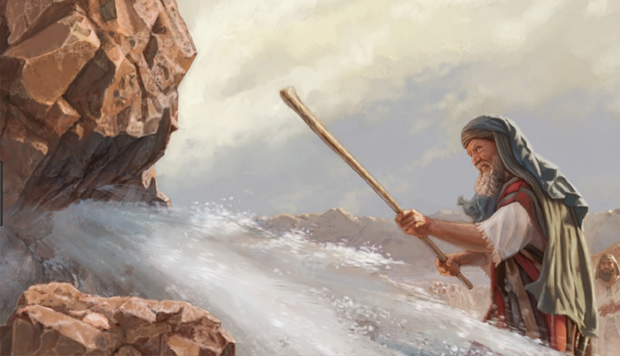Why was Moses barred from entering the Promised Land? On two occasions the leadership skills of Moses are put to the test, and twice, His skills are found wanting.
In Parshat Beshalach, we encounter the first time the children of Israel arrive at Meribah and Massah. There, the Israelites quarreled with God and Moses concerning the lack of water:
He named the place Massah [testing] and Meribah [quarreling] because of the quarrel of the children of Israel and because of their testing the Lord, saying, Is the Lord in our midst or not? – Exodus 17:7
It would seem that Moses had no control over the people's complaining. After all, God had just delivered the people from oppression through Moses. The nation had a front row seat to the awesome judgment wrought upon her oppressors through a series of signs and plagues. The incident of Massah and Meribah raises several questions, among them is the most obvious: After all the miracles they had seen, why were the Israelites so quick to reproach God and Moses?
Remarkably, the Torah records a second encounter at Meribah (Num. 20:13) that sheds light on the issue. The second time the children of Israel arrive at Meribah, the nation once again finds itself without the basic requirements of life and complains bitterly (Num. 20:4-5). In the aftermath of that ordeal, however, Moses is punished despite the obvious shortcomings of the people (vv. 9-13). While questions often arise concerning Moses' apparent disobedience, a more critical question considers why God allowed His people to be without water in the first place?
The Torah explains that God put them through this ordeal because He wanted to train their hearts to turn to Him whenever they were faced with deprivation. Instead of turning on Moses as if he was a human water spigot or as if he was at fault for taking them from Egypt, they should have prayed for water. They failed the test, and held Moses to blame for their plight. The error was in their thinking that God could not have brought them into a waterless wilderness without giving them water all along the way. Thus, when they were out of water, they questioned whether God's presence was with them or not. Astonishingly, the book of Deuteronomy explains that the ordeal was as much a test for Moses as it was for the people:
Because you betrayed Me in the midst of the children of Israel at the waters of Merivath Kadesh, [in] the desert of Zin, [and] because you did not sanctify Me in the midst of the children of Israel. For from afar, you will see the land, but you will not come there, to the land I am giving the children of Israel. – Deuteronomy 32:51-52
The leadership skills of Moses are put to the test, and twice, His skills are found wanting. It is this leadership failure that Moses speaks of in Deut. 32:51. Hashem says that Moses betrayed Him in the midst of the people. How? A shortcoming in leadership. Twice at Meribah, but in reality all through the forty-year journey, Moses could not get the children of Israel to stop being quarrelsome: "They provoked [God] by the waters of Meribah, and Moses suffered because of them (Psalm 106:32)."
Why was Moses punished so severely when it was the people that provoked him? Yeshua explains the following principle concerning degrees of responsibility: "Everyone to whom much was given, of him much will be required, and from him to whom they entrusted much, they will demand the more (Luke 12:48)." The lesson is simple: With greater responsibility comes greater expectations by God. When Moses took the staff to strike the rock a second time, he succeeded in drawing forth water from a stone, but he did not sanctify the Name, at least in the way and to the degree which he had been commanded. While Moses' punishment is puzzling and has been variously interpreted by the commentators, his ordeal is actually a testament to the burden of leadership: "Not many of you should become teachers, my brothers, for you know that we who teach will be judged with greater strictness (James 3:1)."
Moses struck the rock for water both times. The first time, Hashem instructed Moses to strike the rock. The second time, Hashem did not instruct Moses to strike the rock, but he struck the rock anyway. Was it because of Moses’ frustration with the people? Perhaps. But the real problem was that if Moses had properly sanctified Hashem before the people, they would not have been quarrelsome. It was because of this failure that Moses was not allowed into the Promised Land.


